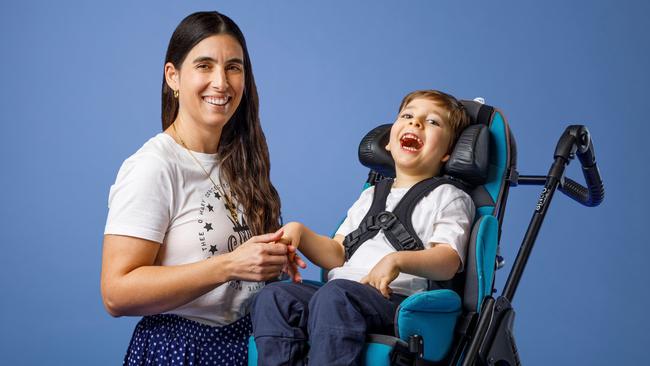Jeans for Genes Day: Westmead scientists work to cure Ornithine Transcarbamylase Deficiency
A four-year-old boy’s parents were told he would not survive beyond a few days but now the western Sydney family is assisting scientists to find a cure for his debilitating condition. Find out how.
Parramatta
Don't miss out on the headlines from Parramatta . Followed categories will be added to My News.
The Hanna family of St Clair is a terrific reason to support Jeans for Genes Day, which raises funds for the vital work carried out at the labs of the Children’s Medical Research Institute in Westmead.
When Teresa gave birth to her fifth child, Emmanuel, she was well-versed on the chaos of raising a newborn baby but nothing could prepare her for the blur of ambulance sirens, seizures, needles, endless tests and being told to prepare for a funeral.
A day after he was born, Mrs Hanna noticed Emmanuel’s temperature had dropped to 33 degrees.
“Had I not called the ambulance when I did, he probably wouldn’t have been alive in the morning,’’ Mrs Hanna said.
“I could have woken up to a dead baby, which is horrendous.’’
Two hospitals and countless tests later, Mrs Hanna and her husband Elias were told Emmanuel had a metabolic disorder called Ornithine Transcarbamylase Deficiency (OTC).
It meant that his liver was not functioning properly to break down proteins into ammonia, which usually leaves the body through urea. Instead the ammonia was staying in his body and his brain was being poisoned and starved of oxygen.
Emmanuel has brain injury from his seizures. He is non-verbal and struggles with muscle control so he cannot hold himself up or walk.

Despite his brush with death (Emmanuel’s family was told his chances of surviving beyond a few days were slim) he has proved doctors wrong.
At seven months, Emmanuel had a liver transplant. His family donated his liver to Children’s Medical Research Institute, where scientists are working on the use of gene therapy to treat OTC-deficiency with one simple injection, to cure children with such metabolic conditions.
The institute’s gene therapy research unit is researching how one correction of a disease-causing mutation in the liver could provide therapeutic benefit for even the most challenging liver disorders.
Dr Samantha Ginn said it could apply to many conditions.
“We are developing novel gene therapies that can cure children with OTC-deficiency and are seeing some impressive results,’’ Dr Ginn said.
“It is a great privilege to have Emmanuel’s donated liver available to us, it means that we can validate our therapies on the target that we want to correct.
“There are an increasing number of successful gene therapies trials making it an exciting time to be in the field.”
Mrs Hanna said Emmanuel was destined to help future generations.
“Just knowing that — that they can find a cure or treatment — that is what I want to happen,’’ she said.
“I want this whole experience to be purposeful. Without the research we’re not going to get any answers.’’
Jeans for Genes Day is on Friday August 5. To donate, visit JeansforGenes.org.au
MORE NEWS




